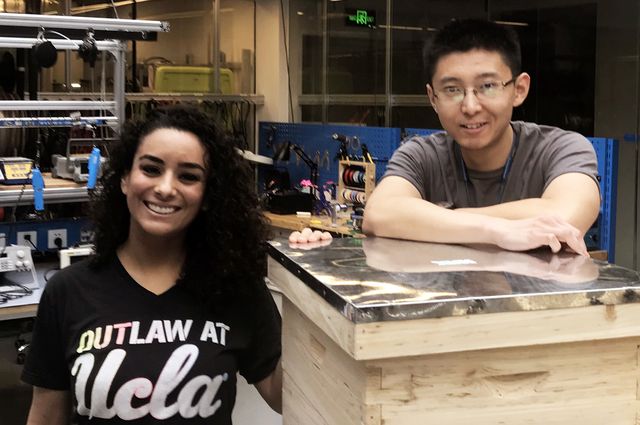A year ago, Sofía Beltran, then a third-year student at UCLA School of Law, joined forces with Tim Yingtian Yu, who was finishing his Ph.D. in civil and environmental engineering at UCLA, to launch a bee business that would help address a crisis in agriculture and allow farmers to make the most of their crops.
Their first stop was the Lowell Milken Institute for Business Law and Policy and its second-annual $100,000 venture-funding contest, the LMI-Sandler Prize for New Entrepreneurs. Beltran and Yu’s team, which also included UCLA Law alumnus Jared Xu, finished in second place and was awarded $30,000.
Buzz is now growing about their firm, SmartAg Technologies. Today, they are adding team members, developing hives that will encourage bee health and raising farmer awareness of how to maintain thriving bee populations, and have attracted an additional $250,000 in venture capital.
As the April 11 final round of the third-annual LMI-Sandler Prize competition approaches, six teams prepare to make their pitches to the judges, who will decide the next winners to follow in Beltran’s footsteps and earn a piece of this year’s $100,000 prize. In the meantime, Beltran, who like Yu graduated from UCLA in 2017, speaks about getting stung by the entrepreneurship bug.
What is happening with SmartAg Technologies right now?
Sofía Beltran: SmartAg Technologies has secured $250,000 of pre-seed investments through the prestigious HAX Accelerator program. We are participating in their 111-day program in Shenzhen, China, the Silicon Valley of hardware development, where we are working with engineers, marketing specialists, seasoned entrepreneurs and other advisors to quicken the growth our technology. Things are moving at lightning speed each day, and we are working hard to develop and refine products that will help monitor and treat beehive health and, in turn, save and sustain the world’s declining bee population.
How can SmartAg make a positive impact in agriculture?
Bees are dying at the rate of 50 percent per year, and this loss will inevitably lead to a major collapse in our global food system if it is not stopped and reversed, because 80 percent of the world’s crops are pollinated by bees. Our business helps commercial beekeepers keep their hives alive and healthy by providing organic, bee-safe, sustainable methods for treating pest-ridden or diseased hives and by providing information on the appropriate amount of food and other health-related treatments for individual hives to ensure optimal survival and growth rates.
How did the LMI-Sandler Prize help SmartAg take off?
Tim and I would never have met without the LMI-Sandler prize competition! He was hunting for a law student in order to participate in the competition, and my reputation as “queen of food law” led to our meeting. We worked diligently for months, preparing our 100-plus-page business plan, and we invested many hours prepping for the final round. It turns out that the competition laid the groundwork for countless additional pitches, business proposals, applications, and time spent networking, revising and spreading our vision.
At UCLA Law, you participated in the Resnick Program for Food Law and Policy and served as president of the Food Law Society. How did that experience help you prepare for this opportunity?
The Resnick Program is why I came to UCLA Law, [executive director] Michael Roberts has been my trusted mentor and friend, and being president of the FLS provided a network of top-tier contacts in food law and policy. That, plus my business and entertainment coursework, gave me wide exposure to the types of issues I have faced in starting up a company, and, more importantly, the tools to know where to look for answers, how to network effectively and how to ask for help when I needed it.
What advice do you have for students interested in entrepreneurial activity in the food space?
Don’t be afraid to put yourself out there and carve your own path! Before law school, I volunteered picking and packing organic produce at Johnson’s Backyard Garden in Austin, Texas, had a cooking blog and just loved to eat. Those hobbies brought me joy and many good friendships, and, over a few years with a lot of persistence, I was able to transform that joy into making connections with the right people [in Los Angeles and at UCLA Law]. Eventually, I positioned myself to accept this opportunity and run with it full blast.
So how, exactly, did you get from a farm in Austin to an accelerator program in China?
During my [second] year, I was very discouraged after applying for positions in food law and coming up empty. Professor Roberts told me to never be afraid of accepting promising opportunities, even if they seemed completely unrelated to what I set out to do. That year, I took professor Steven Derian’s sports law clinic to get some hands-on transactional experience, and that led to a summer internship at the NFL Network and a position after graduation. Fast forward to now: My work at the NFL prepared me to wrangle our start-up’s foundational agreements, finances and negotiations. The NFL had nothing to do with food law, but it prepared me for my role at our start-up once things fell into place.





